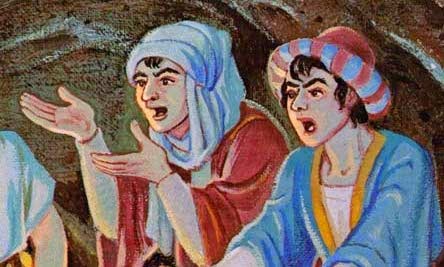 |
| Laman and Lemuel |
The answer may lie in the recent history of Jerusalem and in the prevailing attitudes of its people at the time. Approximately one hundred years before the time of Laman and Lemuel, Hezekiah, king of Judah, defied the Assyrian king, Sennacherib and stopped paying tribute. In retribution, Sennacherib invaded Judah and nearly wiped out the entire kingdom. When he laid siege to Jerusalem the city was saved by either (depending on which source you accept) a plague of some kind that swept through the Assyrian camp (2 Kings 19:35) or by a large payment made to Sennacherib when Hezekiah stripped the temple of all its precious metals (2 Kings 18:13-16) or a combination of the two. (A few years ago I put together a short video depicting this event. You can watch it here.)
Margaret Barker in The Gate of Heaven: The History and Symbolism of the Temple in Jerusalem explained what the result of the city's preservation was on its inhabitants: "The people of Jerusalem were content to believe that the presence of the temple had saved them and would continue to do so" (6, emphasis added). In all probability Lehi's progenitors were refugees from the northern kingdom of Israel who had fled to Jerusalem when Assyria decimated it (the northern kingdom) only twenty years before. They had probably witnessed first hand the immense power of the Assyrian war machine as their homeland was destroyed. It must have seemed all the more miraculous, therefore, when their lives were preserved in Jerusalem and this may have contributed to their confidence that Jerusalem could not be destroyed. This attitude was inherited by Laman and Lemuel and their contemporaries. It turned out, however, that their confidence was tragically misplaced.
In 586 BC, fourteen years, or thereabouts, after Lehi's departure from Jerusalem the Babylonian empire laid siege to the city, slaughtered its inhabitants and razed the temple to the vindication of Lehi and Jeremiah. It would not be until several decades later that the Jews would be allowed to rebuild their sacred edifice following the decree of Cyrus, the Persian king. Unfortunately, the Israelites of that era learned the hard lesson that the Lord would not protect his people unconditionally. His promises could only be secured by obedience to his laws and commandments.
No comments:
Post a Comment